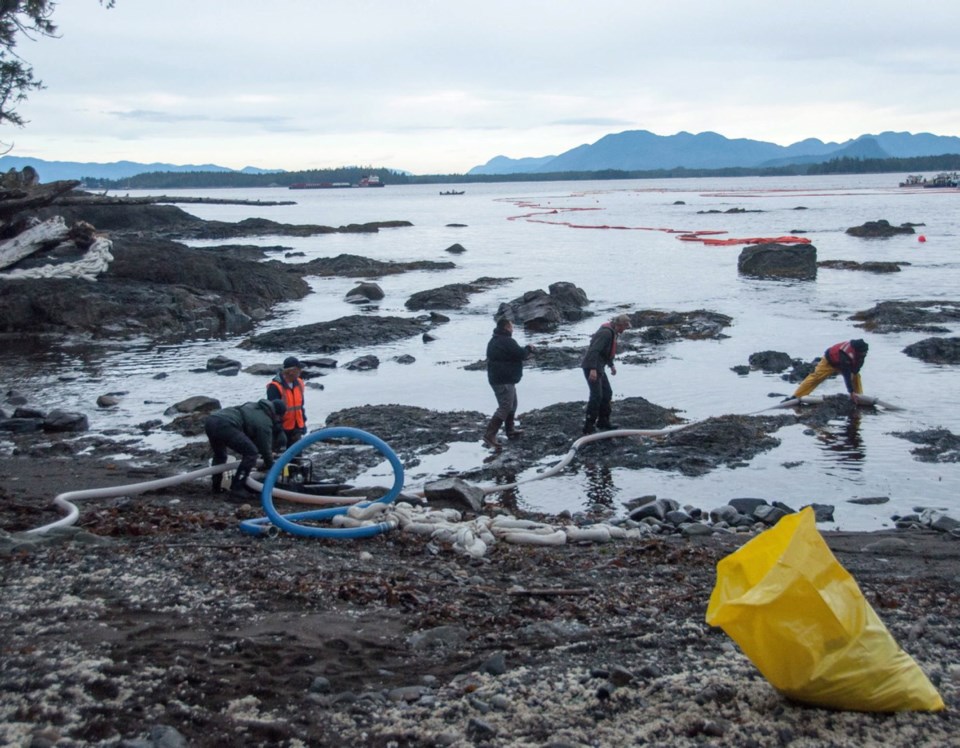 The increased oil-spill response capabilities that are written into all the conditional approvals of the Trans Mountain pipeline expansion make some people blanch, since they suggest catastrophe in the offing.
The increased oil-spill response capabilities that are written into all the conditional approvals of the Trans Mountain pipeline expansion make some people blanch, since they suggest catastrophe in the offing.
But they also suggest a significant marine-employment boom on the coast. Hundreds of millions of dollars have been committed for big upgrades in marine response throughout the Salish Sea, and a lot of it requires people to run and maintain the new systems.
The threat of a spill will dominate the continuing argument over the pipeline. But the huge planned safety upgrade that will finally kick West Coast marine capabilities into the 21st century is very much in the background, particularly since part of it is designed to win the critically needed First Nations support for the project, by knitting coastal bands much more directly into response plans.
The biggest outlay is from the federal government, which put up $1.5 billion for upgrades over five years on all three coasts by way of an Ocean Protection Plan. Announced in November, it was obviously the scene-setter for the subsequent federal cabinet approval of the project. A big chunk of the new resources will be on the West Coast. Regulatory changes, such as tougher response requirements, are in the works, as is an upgrade to give coast guard vessels more towing power.
Also in the works are more research and development related to shipping and navigation. In particular, there are plans for a new program studying the cumulative effects of marine shipping, since the 30 more tankers a month that the pipeline expansion represents are just a fraction of the thousands of ship movements a year.
A new regional response plan on the north coast is promised, as are four new lifeboat stations. Much stress was put on new indigenous community-response teams that are envisioned as a kind of coast guard auxiliary. The Hartley Bay band on the mid-coast has proven itself in some high-profile crises, and the plan is to bolster similar response capabilities elsewhere.
Kinder Morgan has also budgeted its own money for marine upgrades. It committed during the National Energy Board process to $100 million worth of gear to increase capacity, including five new spill-response bases. Also in the mix is the commitment to have three tugs escort each tanker through Vancouver Harbour, and a single tug escort all the way from the harbour to Race Rocks.
The work of guarding against, and preparing for, a disaster has attracted some interest in First Nations. They had the opportunity to write letters to the ministers involved in the provincial environmental approval, and spill response was a priority.
The Esquimalt First Nation signed a mutual-benefits agreement with Kinder Morgan, one of 37 First Nations to do so as of last month. It urged still more capabilities, such as an emergency-response tug and more salvage personnel and equipment:
“Canada should also consult or require consultation with Esquimalt Nation regarding the possibility of training one or more Esquimalt members in spill-response measures ... . First Nations could play an important role in early response to any oil spill within their respective traditional territories if they are equipped with appropriate training and gear.”
The Ditidaht First Nation, whose territory includes the foreshore around Pachena Point, wanted clear commitments to address deficits in emergency marine response and the Ditidahts’ ability to participate in those responses. The band also urged a program to train its members in marine traffic and emergency measures, as well as monitoring, enforcement and stewardship.
The Pacheedaht, near Port Renfrew, also signed a mutual-benefits agreement with Kinder Morgan. It urged the ministers to push for a marine emergency-response centre at Port Renfrew. The closest such centres now on the drawing boards are at Beecher Bay or Ucluelet.
The two ministers who signed off on the B.C. approval, Rich Coleman and Mary Polak, noted that the National Energy Board cited “modest benefits” from enhanced marine response as one of the reasons to approve the project.
Several hundred million dollars worth of new marine resources is an attractive proposition, although the picture would turn ugly in a hurry if the unthinkable happened.



